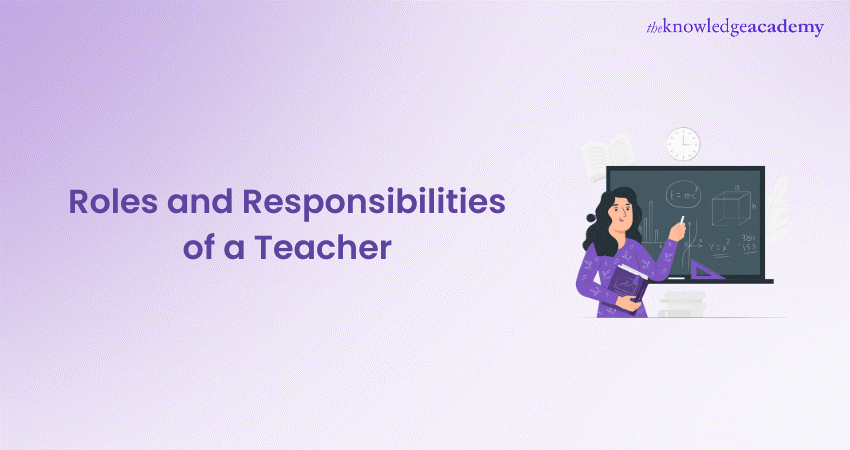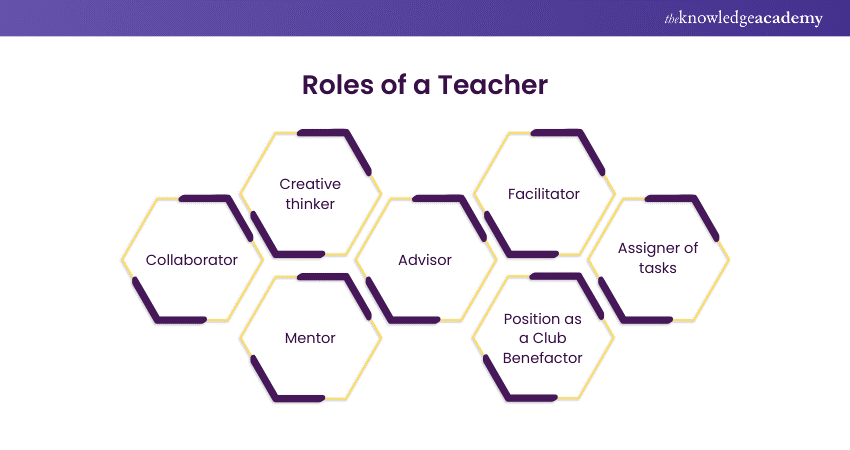We may not have the course you’re looking for. If you enquire or give us a call on +44 1344 203 999 and speak to our training experts, we may still be able to help with your training requirements.
Training Outcomes Within Your Budget!
We ensure quality, budget-alignment, and timely delivery by our expert instructors.

Most of the knowledge we receive from a very young age is from our Teachers. They are pivotal in shaping the intellectual and emotional development of their students. There are several Roles and Responsibilities of a Teacher, which are crucial because they support the holistic development of each student.
If you too are willing to build a promising career in the education domain then you must also be aware of these crucial responsibilities. So, read this blog to learn about a Teacher's Roles and Responsibilities and how they are an integral part of building a supportive learning environment. Let’s delve in to learn more!
Table of Contents
1) Roles of a Teacher
2) Responsibilities of a Teacher
a) Planning
b) Evaluating student advancement and involvement
c) Offering constructive input
d) Upholding classroom order
e) Responsibility for enhancing teaching practices
f) Research and implementing new teaching approaches
g) Designing assessments and supervising examinations
3) Conclusion
Roles of a Teacher
There are several Roles of a Teacher. If you are planning to pursue a career as a Teacher, then familiarise yourself with the following roles of a Teacher:

1) Mentor
As a mentor, a Teacher plays a pivotal role in guiding students throughout their educational journey and personal development. This involves offering advice, support, and encouragement, helping students navigate academic challenges, and fostering their growth and self-esteem. Teachers as mentors also serve as role models, influencing students' attitudes, values, and behaviours and often inspiring them to pursue their interests and goals.
2) Collaborator
Teachers collaborate with various stakeholders in the education ecosystem. This includes working with other Teachers to share best practices, participating in professional learning communities, and engaging with parents and guardians to support student learning. Collaboration extends to working with school administrators and community members, ensuring a cohesive approach to education that benefits the students.
3) Creative thinker
Creativity is a vital aspect of teaching. Teachers must develop innovative and engaging lesson plans, think of creative ways to present information and incorporate diverse teaching methods to cater to different learning styles. Being a creative thinker also involves adapting to various classroom dynamics and finding novel solutions to educational challenges.
Explore the different types of teachers and find out which one matches your personality.
4) Advisor
As advisors, Teachers guide academic matters such as course selection, career paths, and higher education opportunities. They help students understand their strengths and areas for improvement, advise on extracurricular activities, and support them in making informed decisions about their future.
5) Facilitator
As a facilitator, Teachers create a learning environment that encourages students to participate and engage. They guide discussions, foster group work, and create opportunities for students to explore in-depth topics. Teachers facilitate learning by providing resources, structuring activities, and enabling students to participate in their education actively.
6) Assigner of tasks
Teachers are responsible for designing and assigning tasks that align with learning objectives. These tasks, including homework, projects, and assessments, reinforce learning, develop skills, and evaluate student understanding. The role involves ensuring tasks are meaningful, achievable, and appropriately challenging.
7) Position as a club benefactor
Teachers often take on roles beyond the classroom, such as sponsoring or overseeing student clubs and organisations. In this capacity, they support students in pursuing their interests, provide guidance for club activities, and help organise events. This role allows Teachers to engage with students in different settings and contribute to their holistic development.
Responsibilities of a Teacher
Let’s discuss some of the following Responsibilities of a Teacher:
1) Planning
Planning is a fundamental responsibility of Teachers. It involves designing the curriculum and developing lesson plans catering to all students' educational needs. Teachers must ensure their plans align with academic standards and learning objectives.
Effective planning requires considering students' diverse learning styles, abilities, and backgrounds. Teachers must organise resources and materials, structure lessons to maximise engagement and learning, and plan activities encouraging participation and collaboration. Additionally, long-term planning for the academic year is crucial to ensure a coherent educational journey for students.
2) Evaluating student advancement and involvement
Teachers are responsible for continuously evaluating the progress and engagement of their students. This involves assessing students’ understanding of the material, monitoring their participation in class activities, and identifying areas where they may need additional support.
Teachers use assessment tools like quizzes, tests, projects, and class participation to gauge student learning. This ongoing evaluation helps Teachers tailor their teaching strategies to meet individual student needs and ensure that all students progress satisfactorily.
3) Offering constructive input
Providing constructive feedback is an essential responsibility of Teachers. Feedback helps students become aware of their strengths and areas where they can improve, guiding them in their learning journey.
Teachers must ensure that their feedback is clear, specific, timely, and relevant to the student's work. Effective feedback encourages students, boosts their confidence, and motivates them to improve. It's also essential for Teachers to create a safe environment where students feel comfortable receiving and acting on feedback.
4) Upholding classroom order
Maintaining discipline and order in the classroom is crucial for creating a conducive learning environment. Teachers need to establish and enforce clear rules and expectations for behaviour. They should handle disciplinary issues fairly and consistently while promoting a respectful and positive classroom culture.
Effective classroom management involves creating a structured environment where students feel safe, respected, and engaged. Teachers also need to be attentive to the social dynamics within the classroom and address any issues that may disrupt learning.
Enhance your skills as a Virtual Recruiter with our Online Virtual Recruiter Masterclass – join now!
5) Responsibility for enhancing teaching practices
Teachers have a responsibility to improve their teaching practices continually. This involves engaging in professional development opportunities, staying current with educational research and trends, and reflecting on their teaching methods.
Teachers should be open to feedback from colleagues, administrators, and students and willing to make changes to enhance their effectiveness. Continuous professional development is essential for Teachers to grow in their roles and provide the best possible education to their students.
6) Research and implementing new teaching approaches
Teachers must stay informed about new teaching methodologies and technologies. Researching and implementing innovative teaching approaches can enhance student learning and engagement.
Teachers should experiment with different techniques, such as project-based learning, flipped classrooms, or integrating technology, to find what works best for their students. Staying abreast of the latest educational tools and resources can help Teachers create more dynamic and compelling learning experiences.
7) Designing assessments and supervising examinations
Designing assessments is a crucial responsibility of Teachers. Assessments should accurately measure student understanding and align with the learning objectives. Teachers must create various assessment methods, such as written tests, oral presentations, group projects, and practical assignments, to cater to different learning styles.
Supervising examinations is also part of this responsibility, ensuring that assessments are conducted fairly and ethically. Teachers must also provide meaningful assessment feedback to guide students' future learning.
Do you want to know more about Virtual Jobs? Then sign up for our Virtual Online Job Roles Training!
Conclusion
We hope that this blog has helped you understand the Roles and Responsibilities of a Teacher. Heir role is multifaceted and require a blend of planning, evaluation, feedback, classroom management, professional development, innovation, and assessment design. These are integral to fostering an educational environment that supports the development and growth of every student.
Enhance your teaching skills with our Online Teacher Masterclass – register now!
Frequently Asked Questions

A Teacher's prime responsibility is to facilitate learning by creating an engaging and inclusive environment that caters to students' diverse needs. This involves planning and delivering effective lessons, assessing student progress, providing constructive feedback, and continuously improving teaching methods to ensure students' intellectual and emotional development.

As a role model, a Teacher exemplifies positive behaviour, attitudes, and ethics, influencing students to emulate these traits. They inspire respect, responsibility, and passion for learning, shaping students' character and life choices. Teachers impact students' personal and academic lives, which is why they must teach the right things.

Teaching is a gratifying profession, offering the opportunity to impact young lives and shape future generations. It provides intellectual stimulation, creativity in lesson planning, and the satisfaction of seeing students grow and succeed. Despite challenges, teaching is fulfilling for those passionate about education.

Top qualities for Teachers include strong communication skills, patience, empathy, adaptability, and a deep knowledge of their subject matter. They should also be passionate about teaching, have excellent organisational skills, inspire and motivate students, and show continuous commitment to continuous learning and professional development.

The Knowledge Academy takes global learning to new heights, offering over 30,000 online courses across 490+ locations in 220 countries. This expansive reach ensures accessibility and convenience for learners worldwide.
Alongside our diverse Online Course Catalogue, encompassing 17 major categories, we go the extra mile by providing a plethora of free educational Online Resources like News updates, Blogs, videos, webinars, and interview questions. Tailoring learning experiences further, professionals can maximise value with customisable Course Bundles of TKA.

The Knowledge Academy’s Knowledge Pass, a prepaid voucher, adds another layer of flexibility, allowing course bookings over a 12-month period. Join us on a journey where education knows no bounds.

The Knowledge Academy offers various Virtual Online Job Roles Training, including Online Teacher Masterclass, Virtual Assistant Masterclass, and Online Writer or Editor Masterclass. These courses cater to different skill levels, providing comprehensive insights into Benefits of Online Coaching.
Our Business Skills blogs covers a range of topics related to PRINCE2, offering valuable resources, best practices, and industry insights. Whether you are a beginner or looking to advance your Project Management skills, The Knowledge Academy's diverse courses and informative blogs have you covered.
Upcoming Business Skills Resources Batches & Dates
Date
 Online Teacher Training
Online Teacher Training
Fri 28th Feb 2025
Fri 4th Apr 2025
Fri 27th Jun 2025
Fri 29th Aug 2025
Fri 24th Oct 2025
Fri 5th Dec 2025







 Top Rated Course
Top Rated Course



 If you wish to make any changes to your course, please
If you wish to make any changes to your course, please


